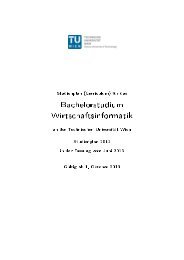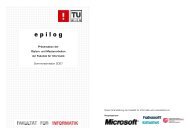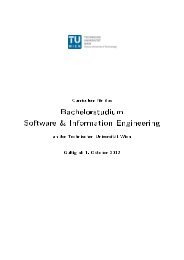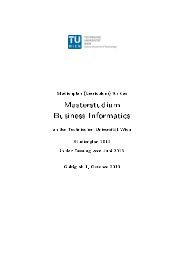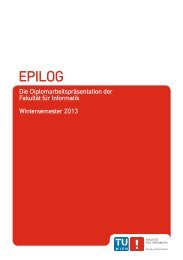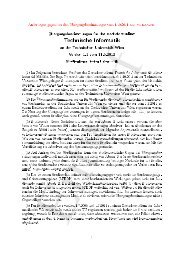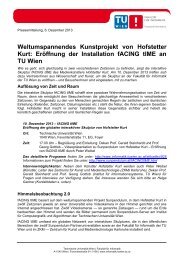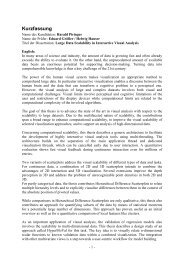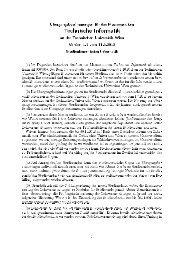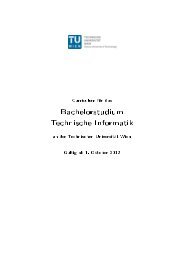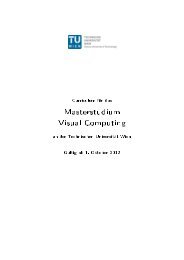Abstract-Band - Fakultät für Informatik, TU Wien - Technische ...
Abstract-Band - Fakultät für Informatik, TU Wien - Technische ...
Abstract-Band - Fakultät für Informatik, TU Wien - Technische ...
Erfolgreiche ePaper selbst erstellen
Machen Sie aus Ihren PDF Publikationen ein blätterbares Flipbook mit unserer einzigartigen Google optimierten e-Paper Software.
Michael Starzinger<br />
Exact Garbage Collection for the Cacao Virtual Machine<br />
Studium: Masterstudium Software Engineering & Internet Computing<br />
Betreuer: Ao.Univ.Prof. Dr. Andreas Krall<br />
Every virtual machine capable of executing Java byte-code needs to perform<br />
some sort of automatic memory management, commonly referred to as<br />
garbage collection. However, it is not specified how this garbage collection<br />
process actually has to be performed. So far the Cacao Virtual Machine<br />
(CacaoVM) used a conservative garbage collector that was designed for<br />
uncooperative environments, thus it has been unable to take full advantage<br />
of the information already present in the runtime infrastructure. This<br />
conservative garbage collector was replaced by an exact one, which has been<br />
tailored to the specific needs of a Java Runtime Environment. In the context<br />
of Java several different components of the virtual machine need to be<br />
orchestrated for exact garbage collection to work. The application threads act<br />
as mutators on the heap and need to be prevented from interfering with the<br />
collector. Another central aspect is identifying the actual references which<br />
point into the heap and prevent objects from being collected. These<br />
references are referred to as the root-set and keep objects alive. The actual<br />
collection algorithms are in charge of cleaning up dead objects and<br />
reorganizing the heap, so that free memory is made available again. Those<br />
algorithms have already been researched in depth over the past decades,<br />
exhibiting vastly different characteristics. All of the above aspects need to be<br />
considered from the perspective of a pure Just-In-Time compilation approach<br />
as taken by CacaoVM. Some crucial simplifications, which rely on fallbacks<br />
into an unoptimized interpreter mode, cannot be applied and need to be<br />
revisited in this setting. Special care was taken to allow future development<br />
towards a generational garbage collection approach by providing the<br />
necessary infrastructure.<br />
Michael Vögler<br />
SILCA - Self-Initiative Load Clustering Agents<br />
Studium: Masterstudium Software Engineering & Internet Computing<br />
Betreuerin: Ao.Univ.Prof. Dr. Eva Kühn<br />
58<br />
To handle the load of a service more efficiently load clustering can be used to<br />
cluster a set of loads into smaller subsets, where each of this so called clusters<br />
captures a specific aspect of the load. There exist many clustering algorithms<br />
reaching from unintelligent to intelligent ones. However most approaches are<br />
very problem oriented and therefore hard to compare. In this thesis we<br />
propose a generic architectural pattern for a load clustering framework that<br />
allows the plugging of different clustering and classification algorithms.<br />
Furthermore this pattern should ease the selection of the best algorithm for a<br />
certain problem scenario. The presented pattern assumes autonomous



